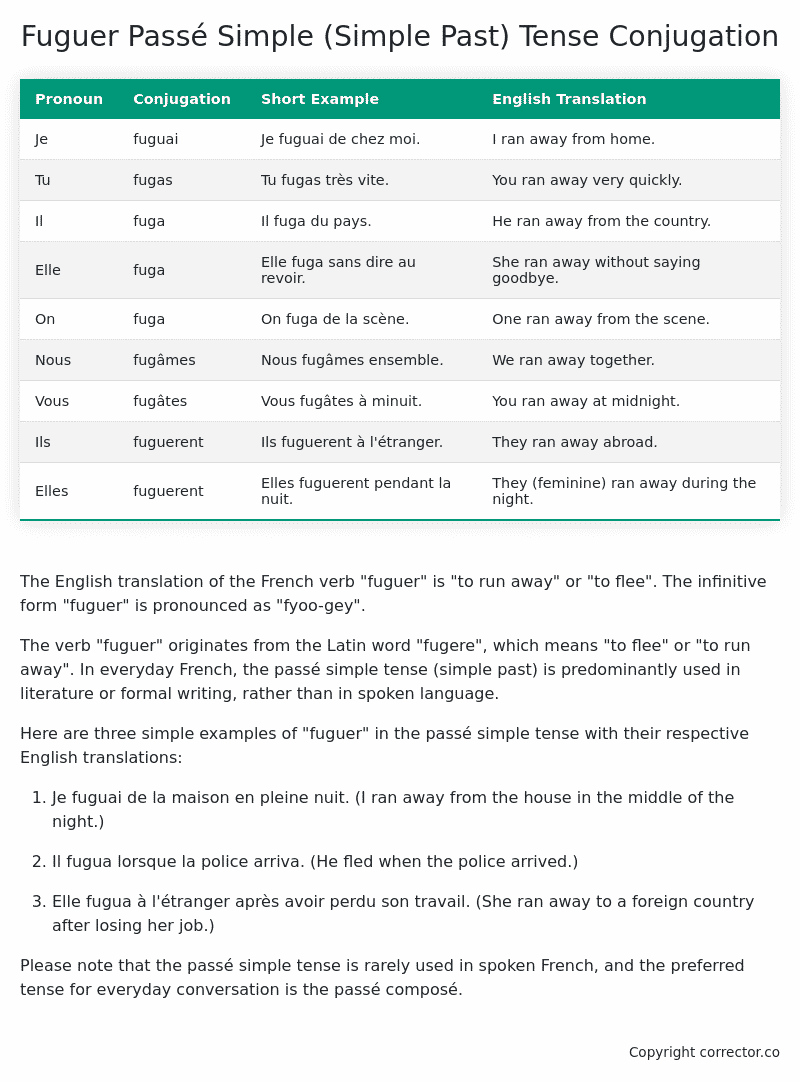Passé Simple (Simple Past) Tense Conjugation of the French Verb fuguer
Introduction to the verb fuguer
The English translation of the French verb “fuguer” is “to run away” or “to flee”. The infinitive form “fuguer” is pronounced as “fyoo-gey”.
The verb “fuguer” originates from the Latin word “fugere”, which means “to flee” or “to run away”. In everyday French, the passé simple tense (simple past) is predominantly used in literature or formal writing, rather than in spoken language.
Here are three simple examples of “fuguer” in the passé simple tense with their respective English translations:
-
Je fuguai de la maison en pleine nuit.
(I ran away from the house in the middle of the night.) -
Il fugua lorsque la police arriva.
(He fled when the police arrived.) -
Elle fugua à l’étranger après avoir perdu son travail.
(She ran away to a foreign country after losing her job.)
Please note that the passé simple tense is rarely used in spoken French, and the preferred tense for everyday conversation is the passé composé.
Table of the Passé Simple (Simple Past) Tense Conjugation of fuguer
| Pronoun | Conjugation | Short Example | English Translation |
|---|---|---|---|
| Je | fuguai | Je fuguai de chez moi. | I ran away from home. |
| Tu | fugas | Tu fugas très vite. | You ran away very quickly. |
| Il | fuga | Il fuga du pays. | He ran away from the country. |
| Elle | fuga | Elle fuga sans dire au revoir. | She ran away without saying goodbye. |
| On | fuga | On fuga de la scène. | One ran away from the scene. |
| Nous | fugâmes | Nous fugâmes ensemble. | We ran away together. |
| Vous | fugâtes | Vous fugâtes à minuit. | You ran away at midnight. |
| Ils | fuguerent | Ils fuguerent à l’étranger. | They ran away abroad. |
| Elles | fuguerent | Elles fuguerent pendant la nuit. | They (feminine) ran away during the night. |
Other Conjugations for Fuguer.
Le Present (Present Tense) Conjugation of the French Verb fuguer
Imparfait (Imperfect) Tense Conjugation of the French Verb fuguer
Passé Simple (Simple Past) Tense Conjugation of the French Verb fuguer (You’re reading it right now!)
Passé Composé (Present Perfect) Tense Conjugation of the French Verb fuguer
Futur Simple (Simple Future) Tense Conjugation of the French Verb fuguer
Futur Proche (Near Future) Tense Conjugation of the French Verb fuguer
Plus-que-parfait (Pluperfect) Tense Conjugation of the French Verb fuguer
Passé Antérieur (Past Anterior) Tense Conjugation of the French Verb fuguer
Futur Antérieur (Future Anterior) Tense Conjugation of the French Verb fuguer
Subjonctif Présent (Subjunctive Present) Tense Conjugation of the French Verb fuguer
Subjonctif Passé (Subjunctive Past) Tense Conjugation of the French Verb fuguer
Subjonctif Imparfait (Subjunctive Imperfect) Tense Conjugation of the French Verb fuguer
Subjonctif Plus-que-parfait (Subjunctive Pluperfect) Tense Conjugation of the French Verb fuguer
Conditionnel Présent (Conditional Present) Tense Conjugation of the French Verb fuguer
Conditionnel Passé (Conditional Past) Tense Conjugation of the French Verb fuguer
Conditionnel Passé II (Conditional Past II) Tense Conjugation of the French Verb fuguer
L’impératif Présent (Imperative Present) Tense Conjugation of the French Verb fuguer
L’impératif Passé (Imperative Past) Tense Conjugation of the French Verb fuguer
L’infinitif Présent (Infinitive Present) Tense Conjugation of the French Verb fuguer
L’infinitif Passé (Infinitive Past) Tense Conjugation of the French Verb fuguer
Le Participe Présent (Present Participle) Tense Conjugation of the French Verb fuguer
Le Participe Passé (Past Participle) Tense Conjugation of the French Verb fuguer
Struggling with French verbs or the language in general? Why not use our free French Grammar Checker – no registration required!
Get a FREE Download Study Sheet of this Conjugation 🔥
Simply right click the image below, click “save image” and get your free reference for the fuguer Passé Simple tense conjugation!

Fuguer – About the French Passé Simple (Simple Past) Tense
Formation
Usage
Narration
Historical Context
Interactions with other tenses
Passé Composé
Imparfait
Conditional and Subjunctive
Summary
I hope you enjoyed this article on the verb fuguer. Still in a learning mood? Check out another TOTALLY random French verb conjugation!


